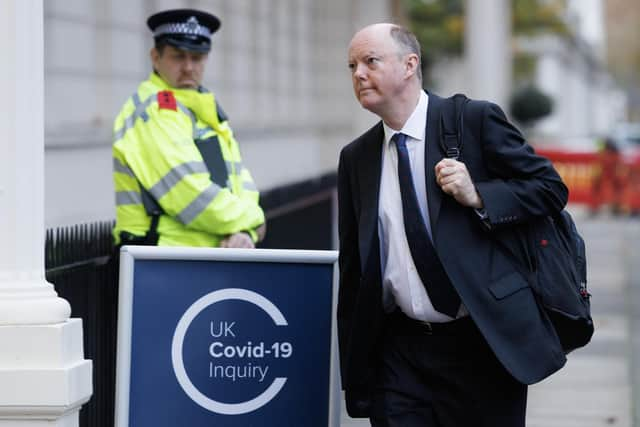UK Covid inquiry: Testimony of scientists Sir Chris Witty and Sir Patrick Vallance feels like the adults are finally in the room
The appearance of Professor Sir Chris Whitty, and from Sir Patrick Vallance earlier this week, was a marked departure from previous testimony from pandemic-era politicians – it felt like the adults were back in the room.
The testimonies of both Sir Chris, the UK’s chief medical officer, and Sir Patrick, the former chief scientific adviser, were grounded in their scientific background and a measured, even tone when explaining their decisions.
Advertisement
Hide AdAdvertisement
Hide AdEven when faced with questioning that hinted at a rift between Sir Chris and Sir Patrick, allegedly exposed in a book by the World Health Organization’s chief scientist Sir Jeremy Farrar, the former spoke more about their similarities rather than their differences. Sir Chris also referred to Sir Jeremy as a friend.


“Was there a tension between you and Vallance?,” Sir Chris was asked. “Jeremy Farrar said this in his book.”
Sir Chris replied: “Well Sir Jeremy, who is a good friend and colleague, had a book to sell, and that made it more exciting, I’m told. My own view was that actually the differences were extremely small.”
Speaking of his advocacy for deprived groups, when lockdowns were being proposed, Sir Chris said: “And the main one – and Sir Patrick, I thought put it very well – was that I saw as part of my role within Sage, in my first role as an individual, to reflect some of the very significant problems for particularly areas of deprivation. I saw for many years the actions that we were taking in terms of what was going to be advised to ministers to consider for what they did next.
“And that I think that was an appropriate thing for me to do and Sir Patrick also thought it was appropriate.”
Contrast this with the appearances of pandemic-era politicians at the UK Covid inquiry – the people who were actually in charge, not the mild-mannered scientists – who have tried to obfuscate the truth and point the finger at each other.
Boris Johnson’s former aide Dominic Cummings told the inquiry there was a “dysfunctional system” during a “meltdown of the British state” that failed to deal with the crisis, while the former prime minister himself allegedly downplayed the pandemic.
The leaking of former health secretary Matt Hancock’s WhatsApp messages also provided an insight into the chaos and confusion surrounding decision making during the Covid pandemic, when politicians allegedly ignored the advice of scientists.
Advertisement
Hide AdAdvertisement
Hide AdTake, as an example, the news the UK Government decided to advise that children wear masks in schools after agreeing it was “not worth an argument” with Nicola Sturgeon over the issue – despite its own scientific advisers saying there was “no strong argument” in favour of the policy.
The WhatsApp leaks show the discussion took place at lightning speed, informally, and with very little time for reflection. But the testimony of the UK’s leading scientists show this was not the case with their advisers, who appear measured, deliberate and, rather unusually for public servants in the UK, quick to admit when they have got things wrong.
Comments
Want to join the conversation? Please or to comment on this article.